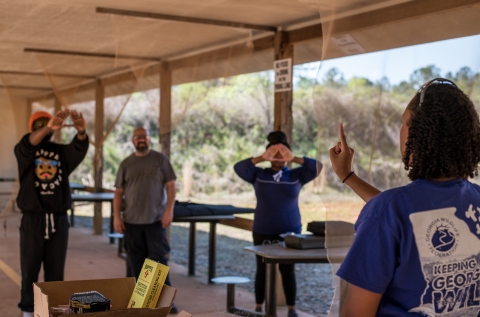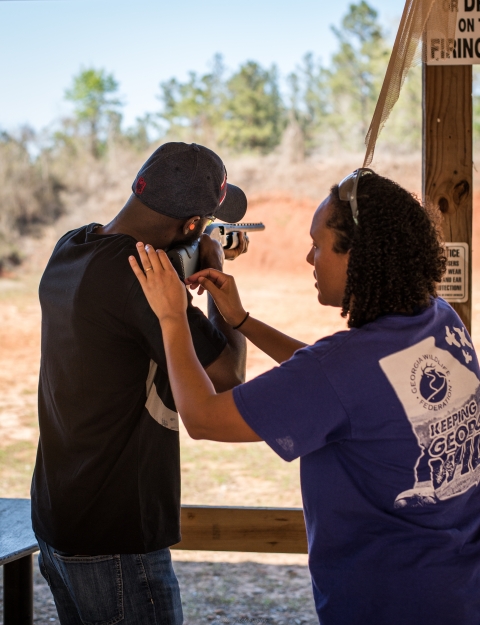College is often a time of self-discovery, and many students seek out new experiences through campus clubs, studying abroad, and trying new activities. Academics Afield is a college learn-to-hunt program created by the Georgia Wildlife Federation in 2019 that aims to introduce students to shooting sports, hunting, and a better understanding of conservation. Supported in part through multistate grant funds administered by the U.S. Fish and Wildlife Service, this initiative is introducing hundreds of young adults to hunting including students at five Historically Black Colleges and Universities across the Southeast.
According to the 2022 National Survey on Fishing, Hunting, and Wildlife-Associated Recreation, 14.4 million Americans participated in hunting in 2022. Of those, 1.5 million identified as African American. “With almost 20 million college students across the country, these diverse networks offer an opportunity to create and welcome non-traditional hunters that are not familiar with hunting culture or may not pursue hunting due to lack of knowledge, access, or social support,” said Breanna Bashford, Georgia R3 Coordinator with the Georgia R3 Initiative. “Research on college students shows that many of them are at a point in their lives where they are creating their identities, they are figuring out who they are, what they want to do, how they want to spend their time, and they are very open to trying new things like hunting.”
After beginning in two Georgia colleges in 2019, multistate grants allowed the Academics Afield program to expand to additional programs at universities in North Carolina, South Carolina, Alabama, Tennessee, Mississippi, Louisiana, and Arkansas. The program now includes HBCUs Alabama A&M University, Albany State University, University of Arkansas at Pine Bluff, Fort Valley State University, and Tuskegee University. The original program workshops at the two founding universities featured diverse groups of students, with over half of the participants being female and 29 percent identifying as minority students. “We were reaching a diverse audience through the program, but we asked what we could do to further bolster participation with underserved communities,” adds Bashford. “With this in mind we used multistate grant funding to expand among HBCUs and foster learn to hunt communities in these institutions.”
Bashford points out that Academics Afield is a resource and framework for colleges, but a large part of the program’s success is flexibility and acknowledging that different groups have different barriers to entry for hunting and target shooting. Prior to establishing programs at HBCUs, students completed a beliefs and values survey to enhance implementation and understand student barriers to hunting and other outdoor pursuits. Of the 700 HBCU students surveyed, 72 percent had never been hunting and over 50 percent of students did not feel welcome by the hunting community. At Fort Valley State University, a land grant institution as well as an HBCU, Dr. Oreta Samples helped lead the effort to bring Academics Afield to campus. “I think many of our students joined the program out of curiosity, they were not familiar with hunting or shooting sports and wanted to learn more,” said Samples. “After the mentor led target shooting lesson, I think many students started to envision themselves as potential hunters and shooting sport participants, they learn the basics and are excited to continue to learn more.”
Along with mentor led trips to the range, Fort Valley State University students participate in a variety of activities through their campus Academics Afield program. During the year-long program students learn curriculum about wildlife biology, hunting strategy, firearm training, animal processing, and students come together for a wild game meal after a mentored hunt. The program model aims to generate peer-based mentoring and help students develop the confidence to continue hunting into the future. In addition to increasing confidence in outdoor pursuits, the program also builds a better understanding of how hunters contribute to conservation and resource stewardship. “Our administration was very supportive of this course and creating a hunting community on campus for students,” adds Samples whose university work focuses on public health. “Along with creating an avenue for students to experience hunting, the program can also build a better understanding of elements like wildlife management and ecology that support student learning and explore the one health concept that our health is tied to the health of our environment.”
Academics Afield efforts are part of a growing R3 community working on Recruitment, Retention, and Reactivation to combat the declining number of active hunters across the country. R3 programs, workshops, and courses work to reverse this trend. “Hunting and conservation are inherently linked,” explains Bashford. “They are linked through our existing funding models with hunter license sales and federal excise taxes on sporting arms and ammunition funding fish and wildlife agency conservation work, and they are linked through the deep connections hunters gain with nature.” For Bashford this program is a way to build this connection and welcome new hunters to a lifelong passion for nature and outdoor pursuits. To learn more about Academics Afield and creating a collegiate hunting community visit the R3 Practitioner’s Guide.






